人教版初中九年级英语上unit 3中考重点知识汇总
- 格式:doc
- 大小:34.50 KB
- 文档页数:5
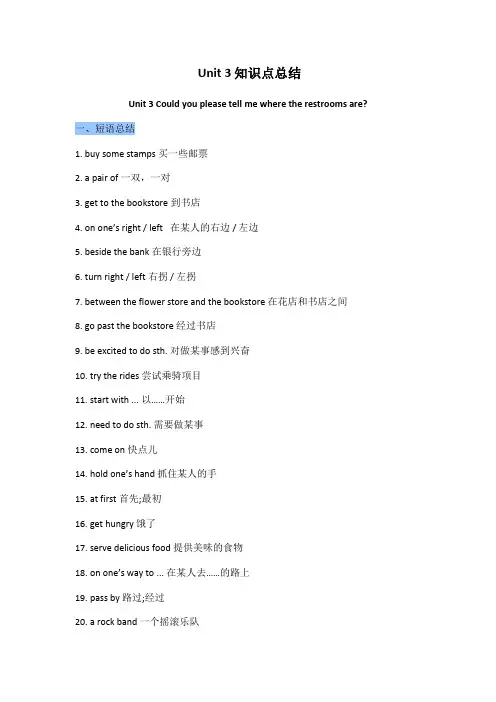
Unit 3 知识点总结Unit 3 Could you please tell me where the restrooms are?一、短语总结1. buy some stamps 买一些邮票2. a pair of 一双,一对3. get to the bookstore 到书店4. on one’s right / left 在某人的右边 / 左边5. beside the bank 在银行旁边6. turn right / left 右拐 / 左拐7. between the flower store and the bookstore 在花店和书店之间8. go past the bookstore 经过书店9. be excited to do sth. 对做某事感到兴奋10. try the rides 尝试乘骑项目11. start with ... 以……开始12. need to do sth. 需要做某事13. come on 快点儿14. hold one’s hand抓住某人的手15. at first 首先;最初16. get hungry 饿了17. serve delicious food 提供美味的食物18. on one’s way to ...在某人去……的路上19. pass by 路过;经过20. a rock band 一个摇滚乐队21. walk up to sb. 向某人走去22. come a little earlier 早点儿来23. pardon me 抱歉,对不起;什么,请再说一遍24. mail a letter 寄信25. go east 朝东走26. visit a foreign country 去国外游览27. ask for help politely 礼貌地请求帮助28. sound less polite / impolite 听起来不怎么礼貌 / 不礼貌29. a direct question 一个直接的问题30. in different situations 在不同的情况下31. depend on 取决于32. speak to sb. 和某人说话33. school trip 学校旅行34. such as 诸如35. e-mail address 电子邮箱地址36. lead into a request 导入请求37. spend time (in) doing sth. 花费时间做某事38. trouble sb. 麻烦某人39. communicate better with other people 更好地与他人交流40. an underground parking lot 一个地下停车场41. pass the salt 递一下盐42. change some money 兑换一些钱43. go on a short study vacation 去游学44. an English-speaking country 一个讲英语的国家45. in a rush 急忙地46. on time 按时二、短语用法集合1.not …… until……直到……才……例如:You never know until you try something.2.let’s do sth 咱们做某事吧!3.spend time doing sth 话费时间做某事4.thank sb for doing sth 为做某事而感谢某人5.would like to do sth 想要做某事6.look forward to doing sth 盼望做某事7.It seems (that)…例如:It seems a rock band plays there every evening.8.Could you please tell me... ?例如:Could you please tell me how to get to the post office?9.take的用法① take some food take some medicine (=have吃,喝)② take notes做笔记③ take one’s temperature( 测量)④ It takes sb some time/money to do somet hing (花费,需要)⑤ I’ll take this coat.(=buy购买)⑥ take somebody / something to(带领,拿去,取)⑦ take a train to Chongqing(乘坐)⑧ take off(脱下)10.turn 的用法:① turn to page 80翻到 80 页② It is your turn. 轮到你了。
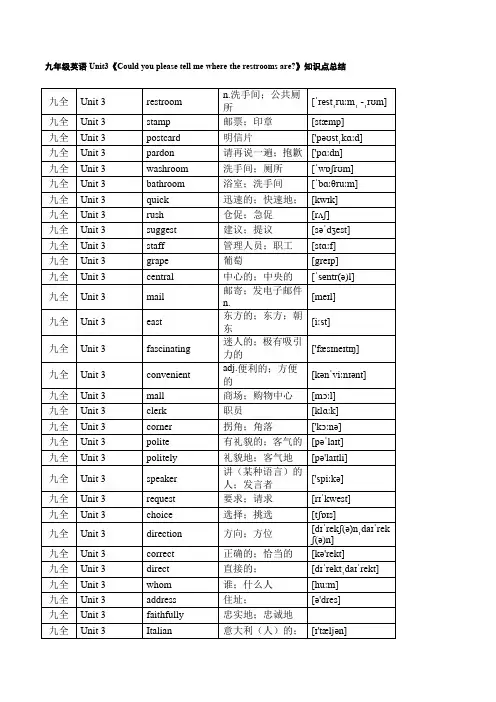
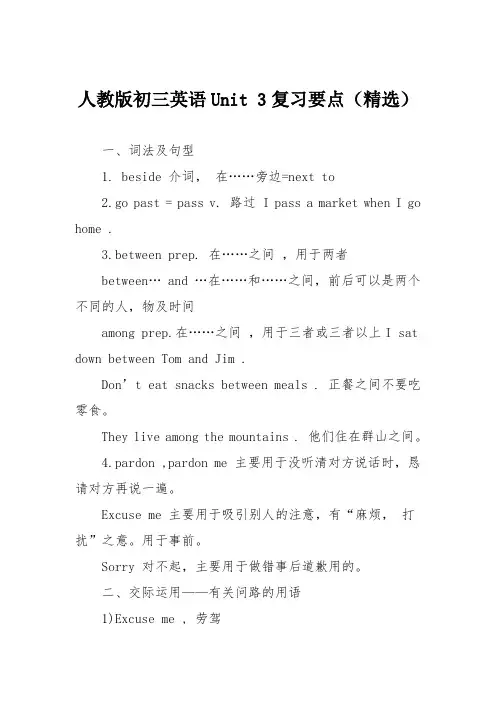
人教版初三英语Unit 3复习要点(精选)一、词法及句型1. beside 介词,在……旁边=next to2.go past = pass v. 路过 I pass a market when I go home .3.between prep. 在……之间,用于两者between… and …在……和……之间,前后可以是两个不同的人,物及时间among prep.在……之间,用于三者或三者以上I sat down between Tom and Jim .Don’t eat snacks between meals . 正餐之间不要吃零食。
They live among the mountains . 他们住在群山之间。
4.pardon ,pardon me 主要用于没听清对方说话时,恳请对方再说一遍。
Excuse me 主要用于吸引别人的注意,有“麻烦,打扰”之意。
用于事前。
Sorry 对不起,主要用于做错事后道歉用的。
二、交际运用——有关问路的用语1)Excuse me , 劳驾①where is ……? ……在哪?②how can I get to ……?我怎样去……?③which is the way to ……?去……是哪一条路?④can you tell me the way to the …please ?你能告诉我去……的路吗?⑤could you tell me how to get to the …please ?你能告诉我怎样去……吗?⑥can you tell me how I can get to the …please ?你能告诉我怎样去……吗?⑦can you tell me where the nearest… is ?你能告诉我最近的……在哪吗?2). How far is it ? 有多远? Is it far from here ? 离这儿远吗?3). Which bus should I take ? Which number do I need ?我该乘几路车/指引方向:1). Walk / Go along / down the road /the street ;沿着这条路 / 街走。
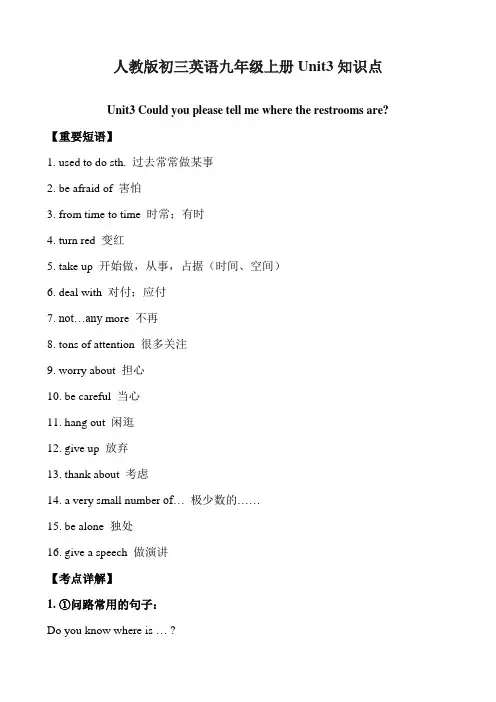
人教版初三英语九年级上册Unit3知识点Unit3 Could you please tell me where the restrooms are?【重要短语】1. used to do sth. 过去常常做某事2. be afraid of 害怕3. from time to time 时常;有时4. turn red 变红5. take up 开始做,从事,占据(时间、空间)6. deal with 对付;应付7. not…any more 不再8. tons of attention 很多关注9. worry about 担心10. be careful 当心11. hang out 闲逛12. give up 放弃13. thank about 考虑14. a very small number of…极少数的……15. be alone 独处16. give a speech 做演讲【考点详解】1. ①问路常用的句子:Do you know where is … ?Can you tell me how can I get to …?Could you tell me how to get to …?②Can/Could/Will/Would you please tell me sth. 表示十分客气地询问事情③Could you tell me how to get to the park? 请你告诉我怎么才能去邮局好吗?上面句子中的how to get to the park是疑问词与动词不定式连用,用作宾语,但不是宾语从句(这一点要搞清楚,它不是宾语从句),相当于how I can get to the park(宾语从句)I don't know how to solve the problem=I don't know how I can solve the problem. 我不知道如何解决这个问题Can you tell me when to leave? =Can you tell me when I will leave? 你能告诉我什么时候离开?2. 日常交际用语:take the elevator / escalator to the … floor 乘电梯/自动扶梯到…楼turn left / right == take a left / right 向左/ 右转go straight 向前直走(straight这个词经常考)3. next to 旁边、紧接着(常见短语)Lily is next to Ann. 莉莉就在安的旁边。
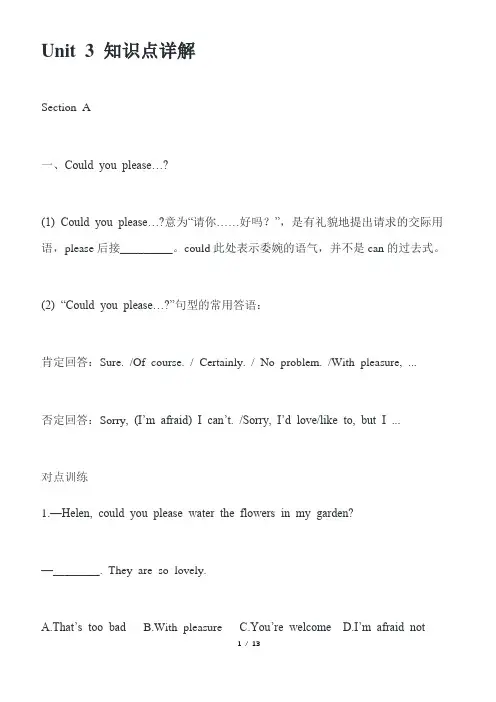
Unit 3 知识点详解Section A一、Could you please…?(1) Could you please…?意为“请你……好吗?”,是有礼貌地提出请求的交际用语,please后接_________。
could此处表示委婉的语气,并不是can的过去式。
(2) “Could you please…?”句型的常用答语:肯定回答:Sure. /Of course. / Certainly. / No problem. /With pleasure, ...否定回答:Sorry, (I’m afraid) I can’t. /Sorry, I’d love/like to, but I ...对点训练1.—Helen, could you please water the flowers in my garden?—________. They are so lovely.A.That’s too badB.With pleasureC.You’re welcomeD.I’m afraid not2.—Could you please do the dishes?—________. I cut my finger and I'm trying not to get it wet.A.Yes, sureB.No problemC.Sorry, I’m afraid I can’tD.That would be fine二、until(1) 当until用于肯定句时,意为“__________”,主句的谓语动词必须是________动词,表示动作或状态一直延续到until所表示的时间为止。
(2) 当until用于否定句时,构成not... until...结构,意为“_______________”。
主句的谓语动词通常是____________动词,表示动作或状态直到until所表示的时间才发生。
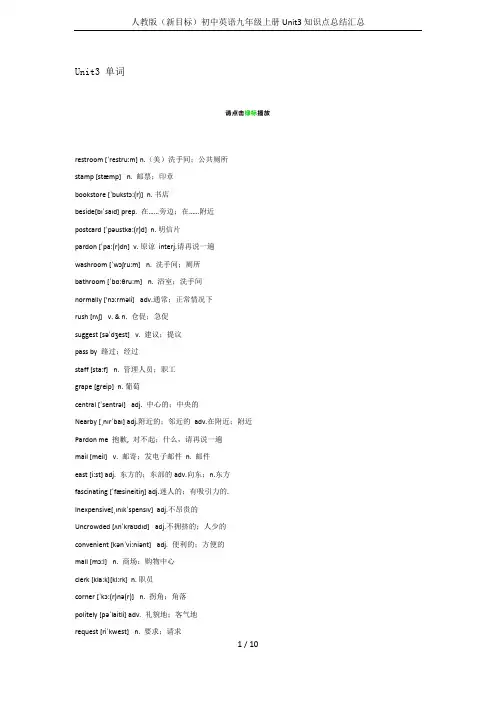
Unit3 单词请点击绿标播放restroom [ˈrestru:m] n.(美)洗手间;公共厕所stamp [stæmp] n. 邮票;印章bookstore [ˈbukstɔ:(r)] n. 书店beside[bɪˈsaɪd] prep. 在……旁边;在……附近postcard [ˈpəustka:(r)d] n. 明信片pardon [ˈpa:(r)dn] v. 原谅 interj.请再说一遍washroom [ˈwɔʃru:m] n. 洗手间;厕所bathroom [ˈbɑ:θru:m]n. 浴室;洗手间normally ['nɔ:rməli] adv.通常;正常情况下rush [rʌʃ] v. & n. 仓促;急促suggest [səˈdʒest] v. 建议;提议pass by 路过;经过staff [sta:f] n. 管理人员;职工grape [greip] n. 葡萄central [ˈsentrəl] adj. 中心的;中央的Nearby [ˌnɪrˈbaɪ] adj.附近的;邻近的adv.在附近;附近Pardon me 抱歉, 对不起;什么,请再说一遍mail [meil] v. 邮寄;发电子邮件n. 邮件east [i:st] adj. 东方的;东部的adv.向东;n.东方fascinating [ˈfæsineitiŋ] adj.迷人的;有吸引力的. Inexpensive[ˌɪnɪkˈspensɪv] adj.不昂贵的Uncrowded [ʌnˈkraʊdɪd] adj.不拥挤的;人少的convenient [kənˈvi:niənt] adj. 便利的;方便的mall [mɔ:l] n. 商场;购物中心clerk [kla:k][kl:rk] n. 职员corner [ˈkɔ:(r)nə(r)] n. 拐角;角落politely [pəˈlaitli] adv. 礼貌地;客气地request [riˈkwest]n. 要求;请求direction [diˈrekʃn] [daiˈrekʃn] n. 方向;方位correct [kəˈrekt] adj. 正确的;恰当的polite [pəˈlait] adj. 有礼貌的;客气的. direct [diˈrekt, daiˈrekt]adj. 直接的;直率的. speaker [ˈspi:kə] n.讲(某种语言)的人;发言者whom [hu:m] pron. 谁;什么人impolite [ˌɪmpəˈlaɪt] adj. 不礼貌的;粗鲁的address [əˈdres], [ˈædres] n.住址;地址;通讯处. Underground [ˈʌndəɡraʊnd] adj.地下的;n.地铁Parking lot n.停车场course [kɔ:(r)s] n. 课程;学科Italian [Iˈtæli ən] adj.意大利人的;n.意大利人语Tim [tim] 蒂姆(男名)02Unit3 知识梳理Unit3 Could you please tell me where ....【重点短语】1.a pair of 一对,一双,一副2.between A and B 在a和b之间3.on one’s / the way to 在去……的路上4.pardon me 什么,请再说一遍5.pass by 路过经过6.look forward to 盼望期待7.excuse me 打扰了请原谅8.get some information about 获取有关……的一些信息9.turn leftight 向左向右转10.go past 经过路过11.a little earlier 早一点儿12.a good place to eat 一个吃饭的好地方13.in different situation 在不同的情况下14.on time 准时按时15.get to 到达16.have dinner 吃晚餐17.on one’s / he right在右边e on 快点请过来19.the shopping center 购物中心20.the corner of....... 的角落/拐角处21.lead into 导入,引入【重点句型】1.问路常用的句子:①Do you know where is … ?②Can you tell me how can I get to …?③Could you tell me how to get to …?④Could/Will/Would you please tell me sth.表示十分客气地询问事情Could you tell me how to get to the park?请你告诉我怎么才能去邮局好吗?2. decide to do 决定做…...She decided to go to have lunch. 她决定去吃午餐。

人教版九年级上册英语Unit3重点知识详解一、【重点词汇】1.重点单词(1)形容词central中心的;中央的The Central Park is not far from the railway station.中央公园离火车站不远。
fascinating迷人的;极有吸引力的Madagascar is the most fascinating place I have ever been to.马达加斯加是我去过的最迷人的地方。
convenient便利的,方便的Venice has convenient watertransportation. 威尼斯水上交通便利correct正确的;恰当的Only one of the answers is correct.只有一个答案是正确的。
polite有礼貌的;客气的Mary is a very polite child.玛丽是一个很有礼貌的孩子。
direct直接的;直率的We pay all our bills by direct debit.我们用直接借记的方式支付所有账单。
indirect间接的He took an indirect route back home.他选择了一条迂回的路线回家。
impolite 不礼貌的;粗鲁的It's impolite to speak up to the old.对老年人大声说话是不礼貌的。
underground地下的Underground resources are particularly rich地下资源尤其丰富。
(2)副词normally通常;正常情况下Normally,he can work out the problem.正常情况下,他能解出这道题。
politely 礼貌地;客气地The waiters in the supermarket always treat customers politely.超市的服务员总是很有礼貌地对待顾客。
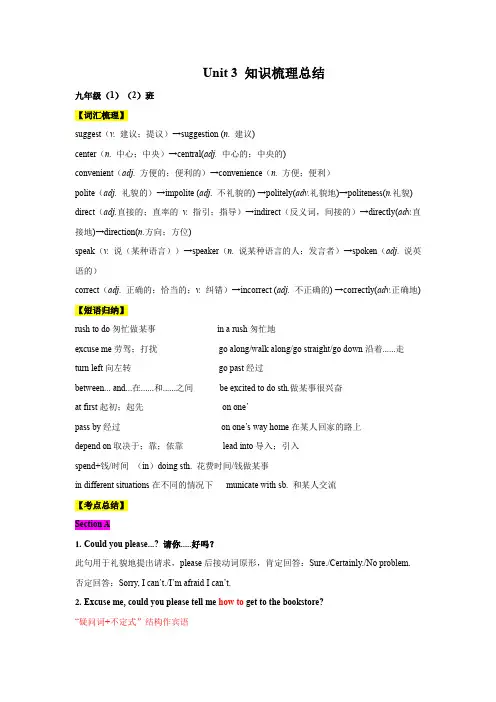
Unit 3 知识梳理总结九年级(1)(2)班【词汇梳理】suggest(v.建议;提议)→suggestion (n. 建议)center(n.中心;中央)→central(adj.中心的;中央的)convenient(adj. 方便的;便利的)→convenience(n. 方便;便利)polite(adj.礼貌的)→impolite (adj. 不礼貌的) →politely(adv.礼貌地)→politeness(n.礼貌) direct(adj.直接的;直率的v. 指引;指导)→indirect(反义词,间接的)→directly(adv.直接地)→direction(n.方向;方位)speak(v.说(某种语言))→speaker(n.说某种语言的人;发言者)→spoken(adj.说英语的)correct(adj.正确的;恰当的;v.纠错)→incorrect (adj. 不正确的) →correctly(adv.正确地)【短语归纳】rush to do匆忙做某事in a rush匆忙地excuse me劳驾;打扰go along/walk along/go straight/go down沿着......走turn left向左转go past经过between... and...在......和......之间be excited to do sth.做某事很兴奋at first起初;起先on one’pass by经过on one’s way home在某人回家的路上depend on取决于;靠;依靠lead into导入;引入spend+钱/时间(in)doing sth. 花费时间/钱做某事in different situations在不同的情况下municate with sb. 和某人交流【考点总结】Section A1.Could you please...? 请你.....好吗?此句用于礼貌地提出请求,please后接动词原形,肯定回答:Sure./Certainly./No problem.否定回答:Sorry, I can’t./I’m afraid I can’t.2.Excuse me, could you please tell me how to get to the bookstore?“疑问词+不定式”结构作宾语①how to do e.g. Please tell me how to deal with these old books.②what to do e.g. Could you please tell me what to do next.③when to do e.g. We haven’t decided when to start.3.问路及指路的表达方式.问路:Could you please tell me the way to...?Where is...?Do you know if there is a ... near here?Can you tell me how I can get to...?指路:Go along/Walk alone/Go down the street until...Turn left at the second turning/crossing.4.The bookstore is on your right, beside the bank.beside (prep.) 在......旁边;在.....附近 e.g. The bookstore is beside the mall.besides (prep.) 除.....之外(还)... e.g. We also like chemistry besides physics.5.You don’t need to rush.(1)作动词,意为“仓促;匆忙行事”rush out of冲出rush into 冲进......里(2)作名词,意为“仓促;匆忙”in a rush仓促;匆忙作名词,还可意为“特别忙碌的时期”at the rush hour在(交通)高峰期6.I was scared at first, but shouting did help.在英语中,通常把助动词do/does/did放在动词原形前,用以加强语气,意为“真的;的确”。
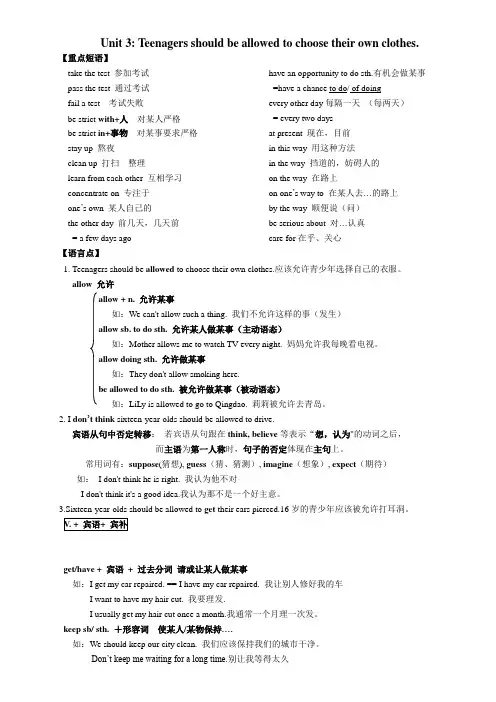
Unit 3: Teenagers should be allowed to choose their own clothes.【重点短语】take the test 参加考试pass the test 通过考试fail a test 考试失败be strict with+人 对某人严格be strict in+事物 对某事要求严格stay up 熬夜clean up 打扫 整理learn from each other 互相学习concentrate on 专注于one ’s own 某人自己的the other day 前几天,几天前= a few days agohave an opportunity to do sth.有机会做某事 =have a chance to do/ of doing every other day 每隔一天 (每两天) = every two days at present 现在,目前 in this way 用这种方法 in the way 挡道的,妨碍人的 on the way 在路上 on one ’s way to 在某人去…的路上 by the way 顺便说(问) be serious about 对…认真 care for 在乎、关心【语言点】 1. Teenagers should be allowed to choose their own clothes.应该允许青少年选择自己的衣服。
allow 允许allow + n. 允许某事如:We can't allow such a thing. 我们不允许这样的事(发生)allow sb. to do sth. 允许某人做某事(主动语态)如:Mother allows me to watch TV every night. 妈妈允许我每晚看电视。
allow doing sth. 允许做某事如:They don't allow smoking here.be allowed to do sth. 被允许做某事(被动语态)如:LiLy is allowed to go to Qingdao. 莉莉被允许去青岛。

九年级Unit3重点知识一词形词块拓展① normal adj. 正常的→ normally 正常地② suggest v. 建议→ suggestion n. 建议,提议suggest doing sth. 建议做某事give sb. suggestions 给予某人建议③ center n.中心,中央→ central adj. 中心的;中央的④fascinate v. 使....入迷→ fascinating adj.迷人的,极有吸引力的⑤expensive adj. 昂贵的→ inexpensive adj. 不昂贵的⑥crowd v.挤满n. 人群,观众→ crowded adj.拥挤的→ uncrowded adj.不拥挤的,人少的⑦convenient adj. 便利的,方便的→ convenience n. 方便,便利,适宜,省事It's convenient for sb. to do sth. 对某人来说做某事是便利的sth. is convenient to/for sb. 对某人来说做某事是便利的⑧polite adj. →impolite adj.不礼貌的,粗鲁的→ politely adv. 礼貌地,客气地sound impolite 听起来不礼貌⑨direct adj. 直接的,直率的→directly adv. 径直地;直接地→direction n. 方向,方位→director n.导演,部门负责人sense of direction 方向感⑩speak v. →spoke (过去式)→spoken (过去分词)→speaker 发言者→n.讲话,发言speech⑪who pron. 谁→ whom pron. 谁,什么人→ whose pron. 谁的二、重点短语Section A怎样到达书店how to get to the bookstore 在银行旁边beside the bank在某人的左边/右边on one’s left/ right 左拐/右拐turn left/ turn right 在.....和.....之间between.....and..... 对做某事感到兴奋be excited to do sth. 尝试乘骑项目try the rides 路过,经过pass by = go past买到一些明信片get some postcards 去二楼go to the second floor不必着急don’t need to rush 抓住某人的手hold one’s hand 以.....开始start with 饿了get hungry一个乐队 a rock band 向某人走去walk up to sb.在某人去...的路上on one’s way to.... 开始做某事start doing sth. =start to do sth. 沿着这条街down the street 一个工作人员 a staff person寄信mail a letter CD 播放器CD player附近的意大利餐厅the Italian restaurant nearby 大声喊的确管用Shouting did help.早点来找到一个位置come a little earlier to get a table沿着......走go/ walk along=go/ walk down/=go /walk up它提供美味的食物It serves delicious food.抱歉,对不起,什么,请再说一遍pardon mebeg one’s pardon 请原谅,对不起pardon sb. for doing sth. 原谅某人做某事获得一些关于这个镇的信息get some information about the townSection B在....的拐角the corner of.... 一个吃饭的好地方 a good place to eat告诉某人做某事tell sb. to do sth. 关于某事问某人ask sb. about sth.第一个听起来没那么礼貌the first one sounds less polite 取决于depend on改变他们说话的方式change the way they speak 更加的礼貌much more polite如何有礼貌地求助how to ask for help politely 在不同的情况下in different situations 问路的相似的请求similar requests for directions花时间来导入请求spend time leading into a request帮助你更好地与某人交流help you communicate better with other people盼望,期待look forward to 早点醒来,唤醒wake up earlier按时,准时on time 急忙地in a rush赶紧做某事rush to do sth. 高峰期rush hour第一次for the first time 感谢某人帮助你help the person for helping you 自我介绍introduce yourself 有礼貌地询问信息politely ask for information 到那里很方便It’s convenient to get to.三.知识点(1) beside的用法①The bookstore is on your right, beside the bank. 书店在你的右边,紧挨着银行。
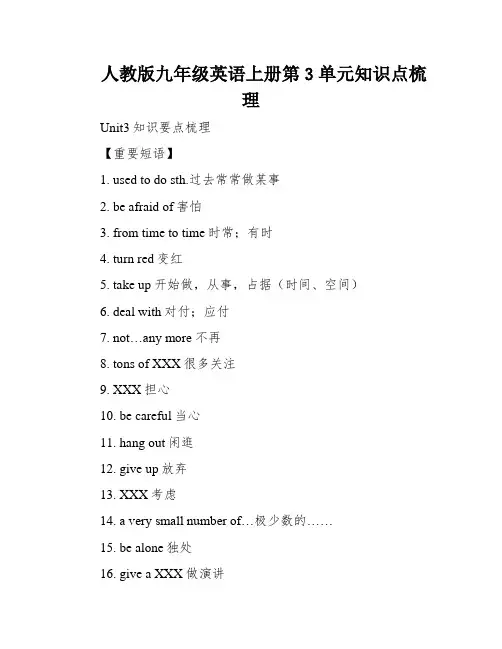
人教版九年级英语上册第3单元知识点梳理Unit3知识要点梳理【重要短语】1. used to do sth.过去常常做某事2. be afraid of害怕3. from time to time时常;有时4. turn red变红5. take up开始做,从事,占据(时间、空间)6. deal with对付;应付7. not…any more不再8. tons of XXX很多关注9. XXX担心10. be careful当心11. hang out闲逛12. give up放弃13. XXX考虑14. a very small number of…极少数的……15. be alone独处16. give a XXX做演讲【考点详解】1.①问路常用的句子:Do you know where is…?Can you tell me how can I get to…?Could you tell me how to get to…?②Can/Could/Will/Would you please tell me sth.表示十分客气地询问事情③Could you tell me how to get to the park?请你通知我怎样才干去邮局好吗?上面句子中的how to get to the park是疑问词与动词不定式连用,用作宾语,但不是宾语从句(这一点要搞分明,它不是宾语从句),相称于how I can getto the park(宾语从句)I don't know how to solve the problem=I don't know how I can XXX.我不知道如何解决这个问题Can you tell me when to leave? =Can you tell me when I will leave?你能告诉我什么时候离开?2.日常交际用语:take the XXX乘电梯/自动扶梯到…楼turn left / right == take a left / right向左/右转go XXX向前直走(straight这个词经常考)3. next to旁边、紧接着(常见短语)Lily is next to Ann.莉莉就在安的中间。
九年级上册英语人教版三单元笔记以下是九年级上册英语(人教版)第三单元的笔记内容:一、重点单词license:n. 执照;许可证silly:adj. 愚蠢的;傻的study:v. 学习;研究present:adj. 目前的;现在的opportunity:n. 机会;时机volunteer:v. 自愿(做某事);n. 志愿者community:n. 社区;社团experience:n. 经验;经历member:n. 成员;会员sleepy:adj. 困倦的;瞌睡的二、重点短语be allowed to do sth. 被允许做某事get their ears pierced 扎耳洞be excited about doing sth. 对做某事感到兴奋take a lot of photos 拍许多照片have a chance to do sth. 有机会做某事at least 至少learn a lot from 从……学到很多at the same time 同时instead of 代替;而不是stay up 熬夜三、重点语法被动语态:英语的语态共有两种:主动语态和被动语态。
主动语态表示主语是动作的执行者,被动语态表示主语是动作的承受者。
被动语态是动词的一种特殊形式,一般来说,只有需要动作对象的及物动词才有被动语态。
汉语往往用"被""受""给"等被动词来表示被动意义。
被动语态由“be 动词+及物动词的过去分词”构成。
被动语态的时态变化只改变be 的形式,过去分词部分不变。
疑问式和否定式的变化也如此。
含有情态动词的被动语态:含有情态动词的被动语态由“情态动词+be+及物动词的过去分词”构成。
四、重点句子I think teenagers should be allowed to choose their own clothes.我认为青少年应该被允许选择自己的衣服。
九年级上Unit 3知识清单Section A一、重点短语1. get some magazines/stamps买些杂志/邮票2. a pair of shoes 一双鞋3. ask for the information about the town 询问关于这个小镇的消息4. pass (by) a bookstore = go past/by a bookstore 走过一家书店5.beside the back = next to/ at the side of the bank 在银行旁边6. go to the second floor 去二楼7. get some postcards 买一些卡片8. try the rides 尝试些乘骑项目9. go on sth继续某事10.be excited to do sth兴奋地做某事be excited about sth/doing sth.11. start with = begin with 以...开始end with 以…结束12. hold my hand 抓住我的手13. come on 加油;得了吧14. walk up to 走向15. go east along 沿着…(向东)走16. on one’s way to sp在去某地的路上17. get angry 饿了18. at the door 在门口19. mail a letter 寄封信20. the Italian restaurant nearby 附近的意大利餐馆二、重点句型1. I was scared first, but shouting did help. 该句话中, “did”的用法是助动词表强调,起加强语气的作用。
同类例句如:I’m not joking, we did go camping last weekend. The summer holiday does start next Monday.2. 英语常见问路/指路表达方式:1) 问路Excuse me/Pardon me, where is the nearest post office?Excuse me, which is the way to the nearest post office?Excuse me/Pardon me, can/could you (please) tell me the way to the post office?Excuse me/Pardon me, how can I get to the nearest post office?Could you please possibly tell me how to get to the library?Excuse me/Pardon me, do you know if there’s a post office around here?Would you please tell me if there is a bank nearby?I wonder +…可加以上所有句型。
人教版初中英语九年级上Unit 3知识点【重要短语】ed to do sth. 过去常常做某事2.be afraid of 害怕3.from time to time 时常;有时4.turn red 变红5.take up 开始做,从事,占据(时间、空间)6.deal with 对付;应付7.not…any more 不再8. tons of attention 很多关注9. worry about 担心10. be careful 当心11. hang out 闲逛12. give up 放弃13. thank about 考虑14. a very small number of… 极少数的……15. be alone 独处16. give a speech 做演讲【考点详解】1.①问路常用的句子:Do you know where is … ? Can you tell me how canI get to …?Could you tell me how to get to …?②Can/Could/Will/Would you please tell me sth. 表示十分客气地询问事情③Could you tell me how to get to the park? 请你告诉我怎么才能去邮局好吗?上面句子中的how to get to the park是疑问词与动词不定式连用,用作宾语,但不是宾语从句(这一点要搞清楚,它不是宾语从句),相当于how I can get to the park(宾语从句)I don't know how to solve the problem=I don't know how I can solve the problem. 我不知道如何解决这个问题Can you tell me when to leave? =Can you tell me whenI will leave? 你能告诉我什么时候离开?2. 日常交际用语:take the elevator / escalator to the … floor 乘电梯/自动扶梯到…楼turn left / right == take a left / right 向左/ 右转go straight 向前直走(straight这个词经常考)3. next to 旁边、紧接着(常见短语)Lily is next to Ann. 莉莉就在安的旁边。
人教版九年级上册unit3知识点Unit 3 知识点九年级上册的 Unit 3 主要涉及到了现在进行时和一般将来时的基本用法,同时还包括了相关的时间状语和频率副词。
本文将结合一些例句和练习来详细介绍这些知识点。
一、现在进行时现在进行时用于描述现在正在进行的动作或状态。
构成为主语+ be 动词(am/is/are)+动词现在分词(-ing)。
例句:1. I am studying for the exam.(我正在复习考试。
)2. She is cooking dinner in the kitchen.(她正在厨房做晚餐。
)指示词“now” 时常和现在进行时连用,表示现在正在进行的动作。
另外,表示一时刻或眼前动作的副词,如“at the moment”, “right now”等也常和现在进行时连用。
例句:1. Don't disturb him. He is studying at the moment.(不要打扰他,他正在学习。
)2. Can I call you back? I am right in the middle of something.(我可以回电话给你吗?我正在忙着呢。
)二、一般将来时一般将来时表示将来要发生的动作或存在的状态。
构成为主语+ will + 动词原形。
例句:1. They will go to the beach next weekend.(他们下个周末要去海滩。
)2. I will help you with your homework after school.(放学后,我会帮你做作业。
)在一般将来时的句子中,常常会出现以下时间状语:tomorrow (明天)、next week(下周)、next month(下个月)、next year(明年)等。
这些表示将来的时间状语可以帮助我们更准确地理解句子的时间表达。
例句:1. She will visit her grandparents next month.(她下个月要去看她的祖父母。
Unit 3 Could you please tell me where the restrooms are?单元重点知识总结重点词汇:1.beside prep. 在......旁边,在......附近●Please e here and sit beside me. 请过来坐在我身边。
2.pardon(1)v. 原谅●Pardon me for breaking the plate. 原谅我打碎了盘子。
(2)interj. 请再说一遍●Please write down your address. 请写下你的地址。
Pardon? 什么?3.normally adv.通常,正常情况下●Normally, it will take you 30 minutes too get there.通常,到达那里需要30分钟。
【拓展】normally的形容词形式是normal,意为“正常的,一般的”●I don’t think he is normal. 我认为他不正常。
4.rush(1)n. 仓促,急促●There is no rush. 不用着急。
(2)v. 仓促,急促●We had to rush our meal. 我们只能匆匆忙忙地吃饭。
5.suggest v. 建议,提议(1)suggest sth. 建议某事●She suggests a trip during the summer vacation.她建议在暑假期间去旅游。
(2)suggest doing sth. 建议做某事●He suggested buying a mobile phone for David.他建议给大卫买一个。
(3)suggest (that) sb. (should) do sth. 建议某人做某事●I suggest (that) you (should) have a conversation with him .我建议你和他谈谈。
九年级上Unit 3知识清单Section A一、重点短语1. get some magazines/stamps买些杂志/邮票2. a pair of shoes 一双鞋3. ask for the information about the town 询问关于这个小镇的消息4. pass (by) a bookstore = go past/by a bookstore 走过一家书店5.beside the back = next to/ at the side of the bank 在银行旁边6. go to the second floor 去二楼7. get some postcards 买一些卡片8. try the rides 尝试些乘骑项目9. go on sth继续某事10.be excited to do sth兴奋地做某事be excited about sth/doing sth.11. start with = begin with 以...开始end with 以…结束12. hold my hand 抓住我的手13. come on 加油;得了吧14. walk up to 走向15. go east along 沿着…(向东)走16. on one’s way to sp在去某地的路上17. get angry 饿了18. at the door 在门口19. mail a letter 寄封信20. the Italian restaurant nearby 附近的意大利餐馆二、重点句型1. I was scared first, but shouting did help. 该句话中, “did”的用法是助动词表强调,起加强语气的作用。
同类例句如:I’m not joking, we did go camping last weekend. The summer holiday does start next Monday.2. 英语常见问路/指路表达方式:1) 问路Excuse me/Pardon me, where is the nearest post office?Excuse me, which is the way to the nearest post office?Excuse me/Pardon me, can/could you (please) tell me the way to the post office?Excuse me/Pardon me, how can I get to the nearest post office?Could you please possibly tell me how to get to the library?Excuse me/Pardon me, do you know if there’s a post office around here?Would you please tell me if there is a bank nearby?I wonder +…可加以上所有句型。
人教版初中九年级英语上unit 3中考重点知识汇总
Unit3 Could you please tell me where the restrooms are?
一、重点短语
1. used to do sth. 过去常常做某事
2. be afraid of 害怕
3. from time to time 时常;有时
4. turn red 变红
5. take up 开始做,从事,占据(时间、空间)
6. deal with 对付;应付
7. not…any more 不再
8. tons of attention 很多关注
9. worry about 担心
10. be careful 当心
11. hang out 闲逛
12. give up 放弃
13. thank about 考虑
14. a very small number of…极少数的……
15. be alone 独处
16. give a speech 做演讲
二、考点详解
1. ①问路常用的句子:
Do you know where is … ?
Can you tell me how can I get to …?
Could you tell me how to get to …?
②Can/Could/Will/Would you please tell me sth. 表示十分客气地询问事情
③Could you tell me how to get to the park? 请你告诉我怎么才能去邮局好吗?
上面句子中的how to get to the park是疑问词与动词不定式连用,用作宾语,但不是宾语从句(这一点要搞清楚,它不是宾语从句),相当于how I can get to the park(宾语从句)
I don't know how to solve the problem=I don't know how I can solve the problem. 我不知道如何解决这个问题Can you tell me when to leave? =Can you tell me when I will leave? 你能告诉我什么时候离开?
2. 日常交际用语:
take the elevator / escalator to the …floor 乘电梯/自动扶梯到…楼
turn left / right == take a left / right 向左/ 右转
go straight 向前直走(straight这个词经常考)
3. next to 旁边、紧接着(常见短语)
Lily is next to Ann. 莉莉就在安的旁边。
4. between…and…在…和…之间
Lily is between Ann and Tom. 莉莉就在安和汤姆的之间。
5. Is that a good place to hang out? 那是不是一个闲荡的好地方?
上面句子中的to hang out修饰前面的名词place,是不定式作定语。
6. expensive 贵的反义词:inexpensive 不贵的
7. crowded 拥挤的反义词:uncrowded 不拥挤的
8. take a vacation == go on a vacation 去度假
9. dress up 打扮dress up as 打扮成
He wanted to dress up as Father Christmas. 他想要打扮成圣诞老人。
10. on the beach 在海滩上,介词用on
11. depend on 根据、依靠、依赖、取决于
Living things depend on the sunlight. 生物对阳光有依赖性。
That depends on how you did it. 那取决于你怎样做这件事。
12. prefer 动词,更喜欢、宁愿,常用的结构有:
prefer sth. 更喜欢某事
I prefer English. 我更喜欢英语。
prefer doing/to do 宁愿做某事
I prefer sitting/ to sit.我宁愿坐着。
prefer sth to sth. 同…相比更喜欢…
I prefer dogs to cats. 与猫相比我更喜欢狗。
prefer doing sth to doing sth 宁愿做某事而不愿做某事
I prefer walking to sitting. 我宁愿走路也不愿坐着。
prefer to do sth rather than do sth 宁愿做某事而不愿做某事
I prefer to work rather than be free. 我宁愿工作而不愿闲着。
(我再次强调一下,prefer的用法真的很重要,这不是开玩笑~)
13. on the other hand 另一方面(一方面:on one hand. 对于这样的短语大家完全可以放在作文中,这样可以使文章增色不少)
14. 把…借给某人:lend sb. sth. = lend sth to sb.(反义词:borrow..from..)
Lily lent me her book = Lily lent her book to me . 莉莉把她的书借给了我。
15. I'm sorry to do sth. 对做某事我觉得很抱歉、伤心。
16. in a way 在某种程度说
17. in order to do srh 为了…,表目的。
He got up early in order to catch the first bus. 他起早床,是为了赶上头班公共汽车。
18. 同级比较:as…as...
as + 形容词/副词原级+ as , 表示“和…一样的…”
He works as hard as we. 他工作和我们同样努力。